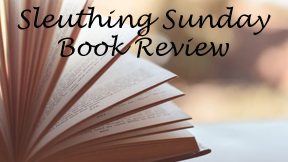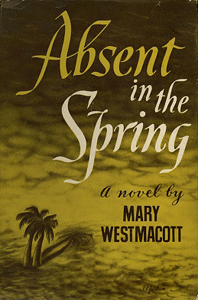“Absent in the Spring” (1944), the third of the six Mary Westmacott novels (but in the second slot in the “Six Mary Westmacott Novels” collection), might be Agatha Christie’s most striking example of getting into a character’s mind. It’s proof that while she might not be much of a character writer in her mysteries, that’s by choice, not lack of ability.
“Spring” takes up only 114 pages of “Six Mary Westmacott Novels” (which admittedly crams a lot of words on each page), and it’s not driven by plot. It’s impressive that Christie not only held my attention the whole way, but kept me engrossed.
Middle-aged but proudly young-looking housewife Joan Scudamore, the type who always stays busy and always plans ahead in practical fashion, finds herself on an accidental sabbatical. She’s on a train-and-car journey home to London after visiting her daughter Barbara in Baghdad.

“Absent in the Spring” (1944)
Author: Agatha Christie, writing as Mary Westmacott
Genre: Character study
Setting: Eastern European desert train station, 1944
Alone with her thoughts
Because of flooding that washes out some of the automobile routes, Joan is stuck at a station in the middle of the desert for almost a week. Her reading material runs out after a couple days. Her writing pad runs out soon after – and besides, it’s wearying to write basically the same letter to multiple people. The Indian and Arab workers aren’t conversationalists.
Joan is left to eat her meals, drink her tea, sleep and think. A school friend from the previous station, Blanche, had actually raised this theoretical situation: “If you’d nothing to think about but yourself for days on end I wonder what you’d find out about yourself.”
Christie smoothly shows how Joan thinks of herself and how Joan truly is, through other people’s eyes. The two characterizations are almost opposites. The common thread is that just as she doesn’t understand where other people are coming from (and how that shapes how they see her), she likewise misunderstands her own self.
Joan is totally real – and sympathetic. While “Spring” is strictly a critique of Joan, it makes a reader uneasy about being criticized, too; the book has a sneaky universality. Although I strive to understand others’ perspectives, like Joan I do enjoy keeping busy (even if I prefer my hobbies to my work). And indeed, being stuck for a week without reading (or at least viewing) material truly is terrifying to me.
Personal yet universal
Christie does a couple things that push “Spring” to another level. First, on one of her walkabouts a little way into the desert, Joan has an epiphany. She realizes how she is seen by others and she realizes that Blanche — who has lived a totally different life with multiple husbands, jobs and residences — might be living a good life from Blanche’s perspective. It might even be a worthy perspective.

Second is the quietly powerful epilog where we get husband Rodney’s inner thoughts about Joan.
Adding to “Spring’s” universality is this quirk: Once Joan is back home in London, her epiphany fades. In the desert, Joan resolves to set a new path in her life thanks to all her wonderful new knowledge; she is excited about apologizing to everyone for transgressions she now grasps, and starting fresh. Back home, she reverts to her old behavior and thoughts.
Cracking her internal code
I think many readers can relate to this oddity wherein things are crystal clear at one point – in a certain place, at a certain time of day, with certain people around – and yet they are clear the other way at a different place, at a different time, around other people.
If that’s not a universal thing, then I guess I’m in the neurological minority on yet another issue. But I can take heart that at least Joan could relate, as could Christie. “Absent in the Spring” is an impressive achievement: simple in structure, yet a complete inner portrait. It lacks plot-driven stakes, yet is there anything more dramatic and important than a person on the verge of cracking their own code?
Well, I’d rather not think about that question any further. Time to move on to the next activity to keep me busy.
Sleuthing Sunday reviews an Agatha Christie book or adaptation. Click here to visit our Agatha Christie Zone.

